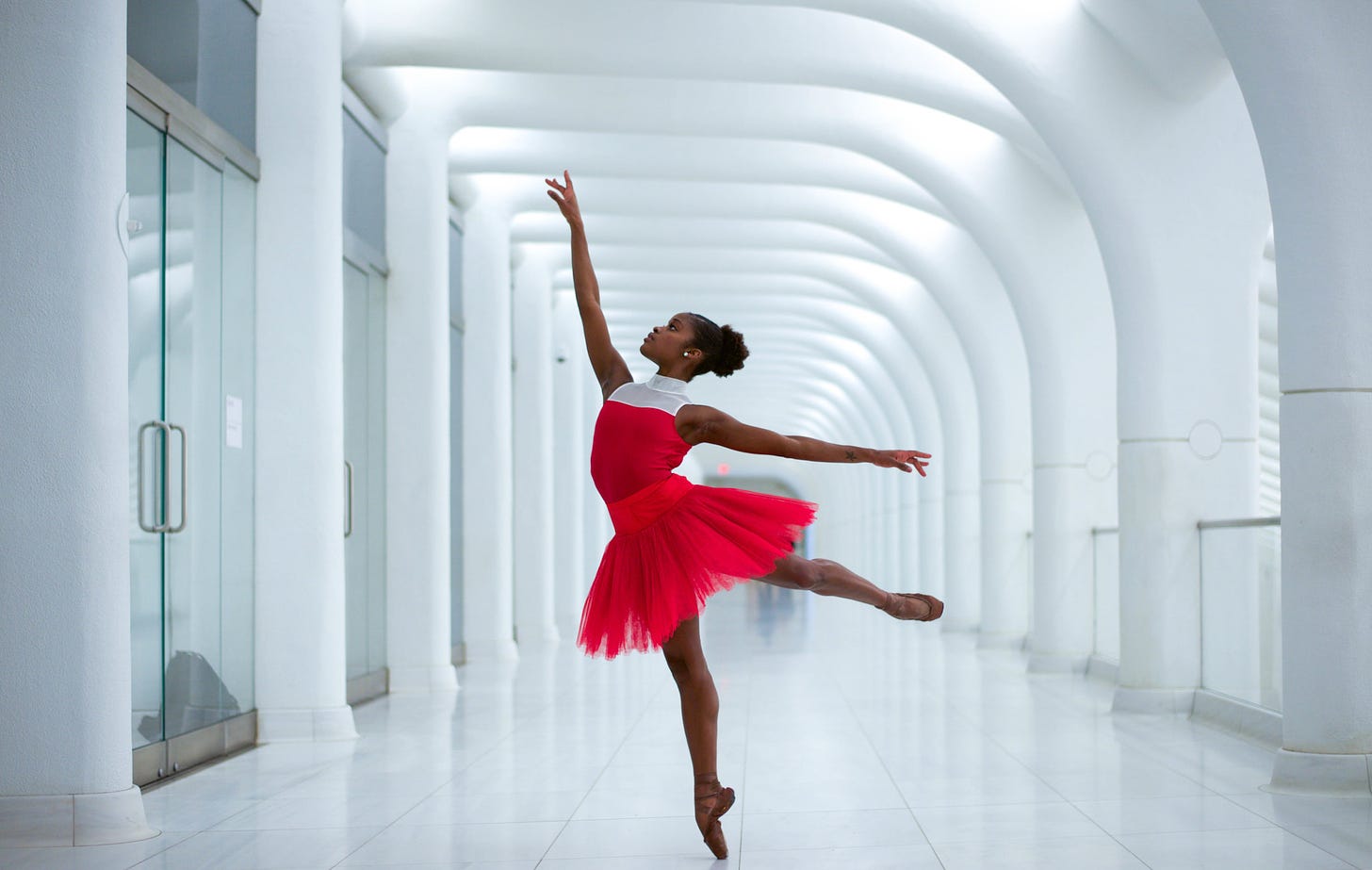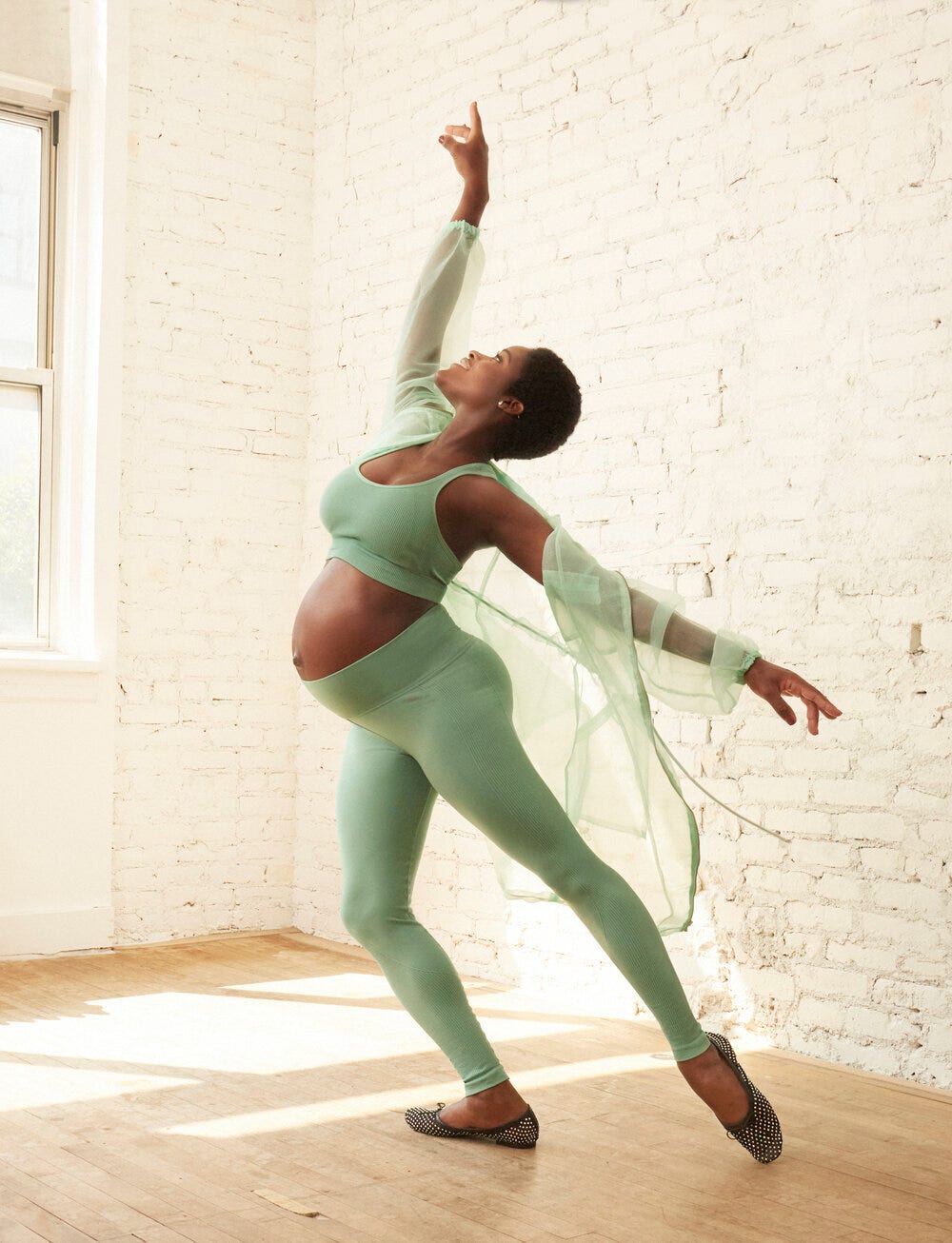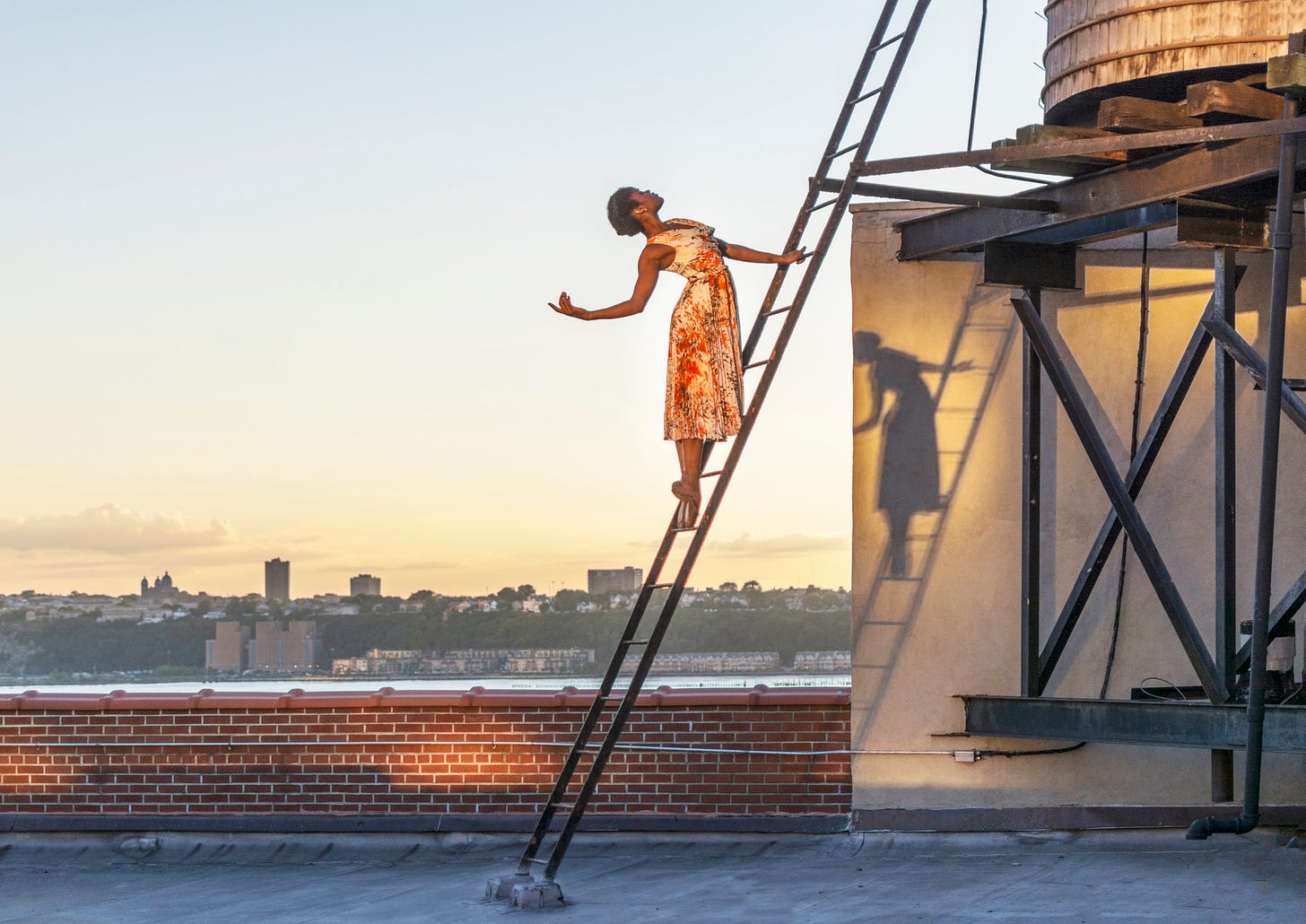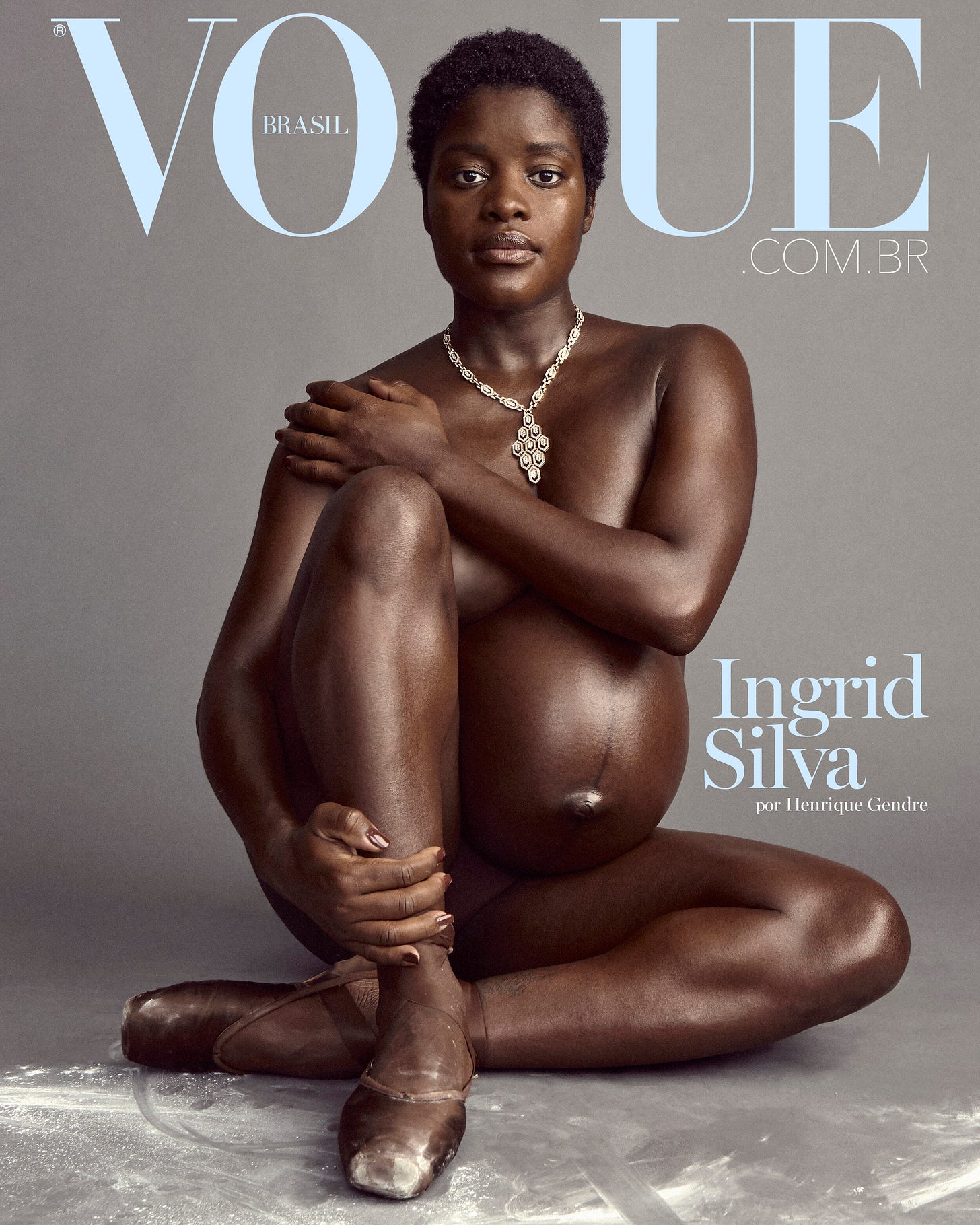Ingrid Silva: On preferring her post-baby body, embracing ambition, and trying to achieve the impossible
Advice from a ballerina and activist
Meet our next creator, Ingrid Silva:
Ingrid Silva
Age: 34
Child: Laura, 2
Location: New York City
Vocation: Ballet dancer with the Dance Theatre of Harlem and activist
Links: Ingrid Silva, Instagram, Dance Theatre of Harlem
We, at least in American culture, think of our lives as a mountain. We go up, we peak, and then we go down. The ascension is when we are growing and learning; the apex is when we look and feel and do our “best”; the descent is the sad downhill slide into invisibility, obsolescence, and then death. (Too dark for a Monday morning?)
This means there’s this tiny dot of a moment when things are as good as they can be. Of course there are indeed certain ages when things on us work better than at other times. There’s a blip when we can run the fastest mile we’ll ever run. There’s an age when our memory starts to fail us. But the problem lies in that we value so few things, or at least we value a few things disproportionately—youth, money, fame—that there’s no breadth of high points. If we could instead see life in terms of stages or waves, with each new era introducing its own range of beauty and wisdom and accomplishments, then we could live a life that doesn’t spike and crash but rather one that satisfyingly rolls along.
The mentality of a life that peaks feeds into the concept of the horrific phrase “getting your body back.” There are umpteen books out there for women to buy that will help them get their bodies back post-baby. The implication is that you had a correct body, a true body, and that was when you were a twenty-something, and that body shall forevermore be the goal: to maintain the appearance of a near-teenager no matter what decade you’re in or what traumas you have been through.
We don’t talk enough about how our bodies change, and are supposed to change, throughout our lives. And if we don’t know what is normal, not only can we not gracefully accept those changes, but those changes become offensive shocks that are traumatic and feel like we are failing ourselves by allowing them to happen.
This all relates to this week’s interview, with the thrilling Ingrid Silva. She was very generous to give me some time as she is preparing for this season’s performances with The Dance Theatre of Harlem, running from April 19–23. And on top of dancing, Ingrid is a busy activist with three organizations: Blacks in Ballet, where they highlight Black dancers globally and share their stories, Dancers and Motherhood, and PodHER New York, an organization that connects women and their dreams.
I was so fascinated to chat with someone whose creativity, whose career, is dependent on her body and to find out what pregnancy and childbirth did to her. I was constantly in awe of the wisdom and level-headedness that Ingrid brings to her life. She worked hard to get back to ballet shape, but she didn’t “get her body back.” She understands that she’ll never have her pre-baby body again. And she’s okay with that. In fact, she thinks she’s better off for it.
Ingrid offers us an example to follow, to try to view our lives as stages instead of as a precarious mountain to which we cling. She’s an inspiration for how we should enjoy and appreciate our bodies, and we can start by talking more openly about how they’re changing and do so with interest instead of shame.
Now, Ingrid, in her own words…
On being pregnant as a professional dancer:
I knew I always wanted to be a mother, but I didn’t know when. When I found out I was pregnant during the pandemic, I was very scared because I had been prioritizing my career, which I still do. But everything was so unknown. So I was not sure what was going to happen after. I was really scared of losing my job and losing the thing I love the most: to be on stage, to be performing. I dedicated my life to this. But I was also very excited and happy to embrace a new journey.
I danced until I was 39 weeks, and that was one of the most amazing, interesting experiences, learning more and more about my body. Sometimes people say, “Oh, yeah, you are dancers. You know a lot about your body.” And I’m like, “No, we don’t.” But I really learned a lot about my body after pregnancy.
I had to change everything when I was pregnant. We weren’t performing because of the pandemic. To keep me in ballet shape, I was working with Bethania Gomez, a principal dancer in the company back in the day, and she created a ballet technique called Ballet and Motherhood. She crafted a ballet class for me as the months went on and on and my belly started growing. So that was a really exciting experience.
On returning to dance postpartum:
After I had Laura, I started class just on my own when she was around three or four months. And then I really came back to the studio with the dancers around six to seven months. It was extremely hard to get back into dancing. I was fighting with my insides; you know, your organs definitely shift. So that was a huge change. I was very loose. My muscles were all over the place. It was a real life lesson. You might be aware that “these are the things that are going to happen to me,” but then there are the things that maybe you don’t know are going to happen. It was one of those moments that you definitely understand more about yourself, and your body, and your everything.
I didn’t do any crazy diet or speed up anything just to be able to get back in shape. I feel like that’s a huge problem in our society. People have to take their time. They have to understand that they have time, that there is no need to rush. And, because of the pandemic, I didn’t have to rush. I was able to enjoy being with Laura at home. I was able to recover myself the way I needed to. I wasn’t comparing myself to anyone either. That really helped. And I think it opened my eyes in so many different ways.
There were very defeated moments that I thought I was not going to be able to make it. But I made a plan. And I set this plan as: I’m going to get back. I’m going to go to CrossFit every day. I used to wake up at 6 a.m. and go to the gym every day. I took ballet class. I took yoga because your mind has to be in place and you have to be sane. I ate very well and I bike rode all of New York City as much as I could.
My husband really helps me in everything I need. We would plan a very, very good schedule, figuring out everything I needed to set up and organize myself. And then he would watch Laura.
On the advantages of her new body:
Everything has changed with my body. I think my body is never going to be what it was, honestly, and I have peace with that. I actually don’t want my body to be like it was before, because I feel like what it was before didn’t give me the extension I needed to have to understand myself more. After being pregnant, I really connected from the inside out in many ways of my life.
My dancing, compared to before, is stellar. Now, my artistry has taken me to somewhere palpable and not imaginary, because ballet has a lot of “imagine if you were under the trees” or “imagine if you were running to the river.” A lot of stuff shifted. It’s not about imagining as much; it’s about living. So there’s something about motherhood that turns the key, you know, and I feel like I’ve turned that key. Coming back to work, I felt like I was hungry for more. I was hungry for the dancing. I was hungry to connect with my experiences. Every day when I get to dance, it is a different way of connecting with my community. And I think I could only have that by becoming a mother.
On rejecting guilt for prioritizing work:
Sometimes, when you become a mother, you forget that you exist. And you dedicate 24/7 to your children. And yes, they do need your love and care. But if you are not a happy mother, then there are no happy children. And I don’t feel guilty at all for saying that because, overall, I’m not just a mother. I am a woman. I have my wishes. I have my career. I want to be on stage. I want to travel. I want to see my friends. And all of that, as I embrace my daughter to my journey, makes her an even better human. She gets to know what I do instead of me stopping my whole life and doing what my baby wants me to do. And I feel like that’s why a lot of women feel guilty. And this is something we have to break in society. We need to bring our kids into our world knowing that we need to teach them everything. Everything that they see in us is what they are going to be.
On developing your own philosophy:
Because I’m an immigrant—I’m from Brazil, and I came to New York when I was 18—I had to live a lot of stuff to understand and to become wise and make my own decisions. It’s not like I had a parent that could come and rescue me at the first thing. I’ve never had that. It took my mom eight years to be able to come see me dance on stage in New York.
But I’ve always been very connected to my family. My mom is my biggest fan, and she is my rock. I am everything that I am today because of my mom, and she is a very assertive woman. I learned a lot from her, and I want to pass that on to my daughter.
What I’ve been learning, with the responsibility of being a mother, is that it’s not about making other people happy all the time. You have to be happy. There are ups and downs, and I don’t have it all together, and there are certain days that I want to cry and I’m tired. Like today, I’m exhausted because we have our new preparations for the New York season next week. It’s very demanding. We have a lot of details to learn. We have many rehearsals. We’ve been traveling a lot on tour. I also have a baby. So, you know, it’s a lot going on. But I’m prioritizing positive energy, even though I’m tired, because energy to me is very important. We don’t realize that you are the energy you carry, and what you pass onto other people is what you are feeling. Energy is about feeling and connecting.
On loving your body:
It’s really important for us to embrace how we look instead of wishing for the perfect something, because no one has that perfect something. A lot of phrases that I used to hear my mother say when I was young, I wouldn’t repeat to my daughter, because my mom didn’t know what she meant. Body positivity and things like that are so subtle that sometimes we don’t know what we are talking about. But we are passing on those little traumas that each one of us has, and we don’t realize it.
When I teach my students, I want them to feel embraced and loved and love their bodies and be positive about what they’re showing. It’s really important for me. Each person has their own body. And especially with ballet, we have all different bodies and we are trying to achieve the impossible. But what exactly is impossible? What exactly is the perfect thing? I still don’t know. And maybe I will never know. But as for now, I’m working with the best that I can. And it’s working.








